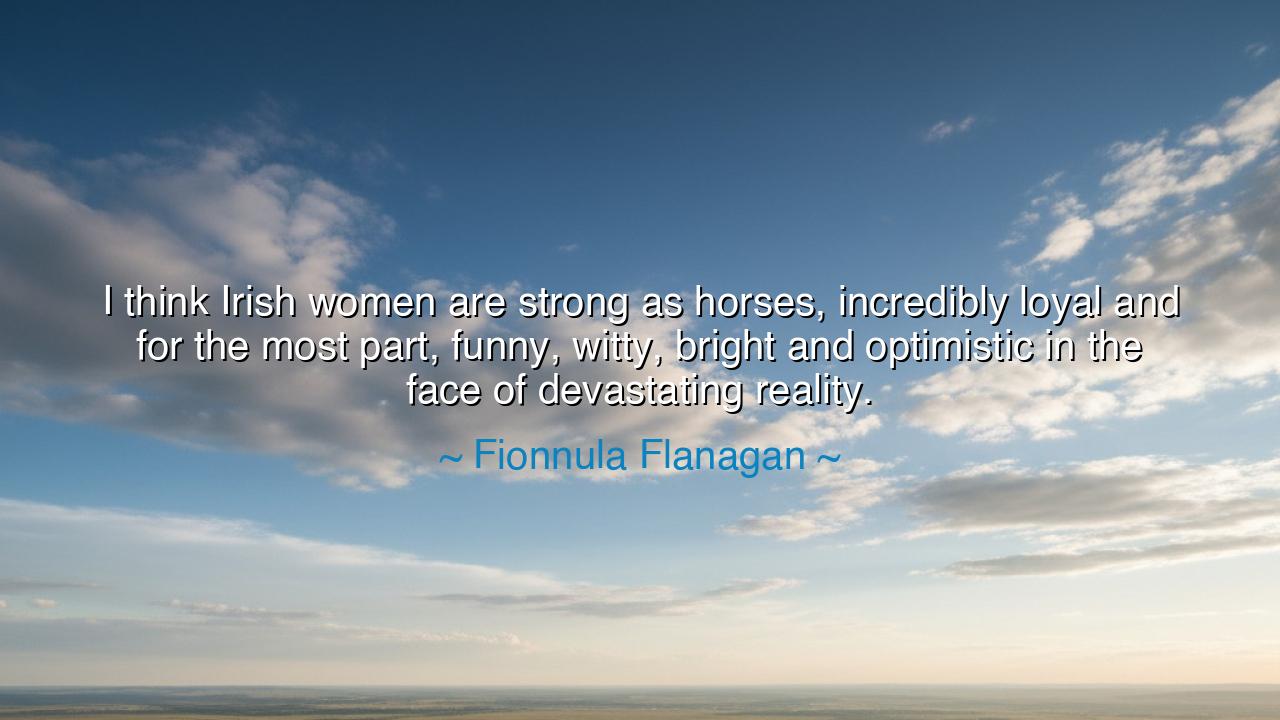
I think Irish women are strong as horses, incredibly loyal and
I think Irish women are strong as horses, incredibly loyal and for the most part, funny, witty, bright and optimistic in the face of devastating reality.






In the words of Fionnula Flanagan, “I think Irish women are strong as horses, incredibly loyal and for the most part, funny, witty, bright and optimistic in the face of devastating reality.” — there resounds a hymn to endurance, a tribute to the radiant fire that lives within the human spirit, and especially within the heart of the Irish woman. Her words are not mere praise, but remembrance: an honoring of those who have borne the weight of sorrow yet continued to sing. To be strong as horses is not only to endure the burdens of life, but to do so with grace, with laughter, and with that fierce, quiet hope that refuses to be broken.
For the Irish woman, as Flanagan describes, is both warrior and poet. History carved her through storms — famine, exile, and grief — yet she stood unyielding, her spirit anchored in loyalty and wit. It is said that when Ireland wept, it was her women who gathered the tears and turned them into stories. They found light where none was promised. Their humor was not a mask but a shield, their brightness not naivety but defiance. To laugh in the face of devastating reality is to proclaim to the world, “You will not take my soul.”
In the annals of Ireland’s history, there is the tale of Grace O’Malley, the pirate queen of Connacht. She ruled her ships and men with wisdom sharper than any blade, and though English forces sought to humble her, she met Queen Elizabeth herself with unbowed pride. Grace was strong, loyal, and witty, a woman who refused to be defined by her suffering or her time. Like the women Flanagan speaks of, she faced the cruel winds of fate with optimism, not because she denied hardship, but because she understood its place in the making of her soul.
The origin of this strength lies deep within the soil of Ireland — a land of contradictions, of beauty and hardship entwined. It is a country that has known hunger and song in the same breath, loss and laughter in the same heart. The women of Ireland learned early that to survive, one must not only fight but hope, not only endure but shine. Their humor became a prayer, their wit a weapon, their loyalty a bridge across despair. This is the alchemy of the Irish spirit: to turn grief into gold, sorrow into story, and pain into purpose.
Fionnula Flanagan’s words are not bound to Ireland alone; they speak to the universal power of womanhood, to that sacred ability to bear the unbearable and still smile. Every woman who has carried her family through hardship, who has found light in ruin, who has laughed through tears, stands in this lineage. The strength of horses is not in muscle alone but in endurance — the quiet power to move forward when all else falters. And so it is with these women: loyal when betrayed, bright when surrounded by darkness, eternally alive in spirit even when the body grows weary.
Let this be a lesson to us all: that optimism in the face of devastation is not foolishness — it is courage. It is the art of the soul refusing defeat. To be witty in hardship is to remember one’s humanity. To be loyal when life is cruel is to choose love over bitterness. The ancients taught that the truest strength is not the ability to conquer others, but to master one’s own despair. The Irish woman embodies this mastery — a living flame that neither wind nor time can extinguish.
So, my friends, take this wisdom into your days. When hardship comes — as it will — remember the example of these women. Stand strong as horses, not with anger, but with steady grace. Be funny, even when life’s humor seems cruel, for laughter is the echo of divine resilience. Be witty and bright, for intelligence and joy are the twin lights that guide us through dark forests. Be loyal, for love anchors the soul in storm. And above all, be optimistic, not because the world is kind, but because your spirit is stronger than the world’s cruelty.
In the end, Fionnula Flanagan speaks of something eternal — the triumph of the human heart over despair. Her words remind us that even amid devastation, there is music; even in the ashes, there is light. To live like the Irish women she honors is to live with courage clothed in laughter, wisdom wrapped in warmth, and hope unbroken by the weight of reality. It is to declare, through every hardship and every dawn: “I am still here. I am still shining.”






AAdministratorAdministrator
Welcome, honored guests. Please leave a comment, we will respond soon